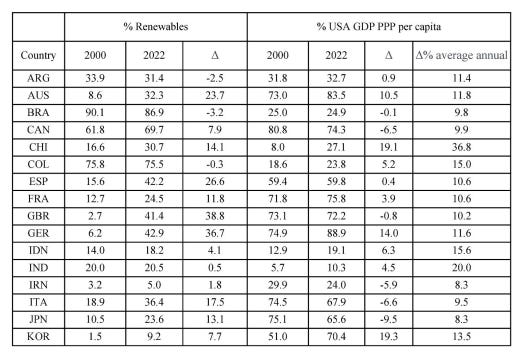Brazil's Energy Future: A Deep Dive into Policy Evolution and Opportunities
A comprehensive analysis of Brazil's Energy Policy and Strategic Pathways for growth
Brazil stands at a pivotal point in its energy development, with the potential to become a global leader in both renewable and non-renewable energy. Our recent study, SWOT Analysis of Brazilian energy policy: A comparative panel data analysis of the twenty largest economies, published in Energy Policy, provides a detailed examination of Brazil's energy policies from 2003 to 2022. We explore the main drivers of Brazilian energy policy and discuss how the energy sector can become a transformative force in driving industrial growth and enhancing global competitiveness.
Brazil is endowed with abundant energy resources, including vast renewable sources such as hydro, wind, and solar power and significant non-renewable resources. This rich mix positions Brazil for a potential energy surplus, which could be a key driver for its industrialisation and economic growth. The study underscores the need for a robust legal framework to support offshore energy projects. It highlights the critical role of private capital in developing the energy sector, especially given the limited capacity for state investment.
Our research employs a SWOT (Strengths, Weaknesses, Opportunities, Threats) analysis to assess the strengths and weaknesses of Brazil's energy policies and identify opportunities and threats in the energy market. By comparing Brazil with nineteen other large economies, the study provides a comprehensive view of the factors influencing Brazil's energy sector.
The study's detailed SWOT analysis highlights several critical aspects of Brazil's energy policy landscape. Among the strengths, Brazil's renewable energy sector stands out. The sector demonstrates remarkable growth and economic performance despite lower investment levels than developed economies. The country's ability to harness its abundant renewable resources, such as biofuels, wind, and solar energy, positions it well for future expansion. These sectors are poised for growth, driven by technological advancements and favourable market conditions.
However, the study also points out several weaknesses and threats that need to be addressed to unlock Brazil's energy potential fully. Political and legal uncertainties are significant challenges impacting the stability and growth of the energy sector. The process of obtaining environmental licences is complex and time-consuming, which poses a barrier to developing energy projects. Finally, the concentration of energy projects in more affluent areas often exacerbates regional inequalities, leaving less affluent regions behind.
Brazil's renewable energy sector is performing at par with developed economies, demonstrating high potential for green energy despite lower levels of investment. The biofuels, wind, and solar energy sectors show great promise for growth, driven by technological advancements and favourable market conditions. The potential energy surplus can be leveraged to drive industrial growth, create jobs, and enhance economic development. However, the study identifies significant challenges posed by political and legal uncertainties, which affect the stability and growth of the energy sector. The process of obtaining environmental licences remains complex and time-consuming, posing a barrier to energy project development. Additionally, energy projects often contribute to regional inequalities, mainly when concentrated in more affluent areas.
In the 2000s, Brazil led in per capita biofuel production. However, it was surpassed by the United States between 2010 and 2018 before regaining its lead in recent years (Fig. 1). Regarding total production, the United States and Brazil account for 42.2% and 25.9% of global biofuel production, respectively. Brazil is the world's second-largest consumer and producer of ethanol. There is a noticeable trend of increasing biofuel production in major economies, while countries like Turkey, Mexico, Russia, Japan, Iran, and the United Kingdom show negligible production. Nearly all ethanol in Brazil is derived from sugarcane, significantly reducing greenhouse gas emissions compared to gasoline. The biofuel sector is the third-largest electricity generator in Brazil, following hydroelectric and wind power. By the end of 2021, Brazil had achieved 15.8 GW of installed biomass capacity, including sources beyond sugarcane bagasse, making it the second-largest in the world for installed biomass power capacity.
Fig. 1. Index - Biofuels Production per capita.
Source: World Bank Database: https://data.worldbank.org/ accessed on 15.01.2023; Our World in Data: https://ourworldindata.org/energy accessed on 15.01.2023; OPEC Database: https://asb.opec.org/data/ASB_Data.php accessed on 15.01.2023; IEA Database: https://www.iea.org/data-and-statistics accessed on 15.01.2023
In discussions about the relationship between economic growth and various energy industry indicators—such as consumption, production, and renewable energy use—it is possible to evaluate how successfully different countries have transitioned to renewable electricity generation between 2000 and 2022. A comparison of selected economies reveals a clear trade-off between high GDP PPP per capita growth and the lack of policies for transitioning to renewable sources in electricity generation, as seen in Russia (Table 1). South Korea, Indonesia, Argentina, and Colombia also show moderate economic growth with minimal or no progress in the transition to renewable energy.
In contrast, China, Turkey, and India have significantly increased the share of renewables in electricity generation while experiencing much higher economic growth than other countries, including the United States. Several countries, such as Australia, Spain, the United Kingdom, and Germany, have maintained economic growth rates similar to the United States and have quickly transitioned to renewable sources, especially wind and solar energy.
North America and France have shown lower intensity in their transition to renewables due to their high reliance on nuclear or non-renewable energy sources, which has not notably affected their growth rates compared to countries with similar GDP PPP per capita levels. Some countries, like Italy, Canada, Iran, and Japan, have experienced lower growth than the United States but have undergone rapid or moderate transitions in their electricity grids. Mexico, however, has not significantly altered its share of renewable sources in electricity generation.
Brazil stands out in terms of its high level of renewable energy participation. In 2023 and 2024, Brazil achieved 100% renewable energy for at least six months each year and maintained a 90% level throughout these years. Nevertheless, the country still needs to complete its transition.
Most countries with GDP PPP per capita higher than Spain have managed to increase the participation of renewable sources in their electricity grids by at least 10%, with South Korea being the exception due to its slower transition. Most developing countries, excluding China and Turkey, have yet to achieve significant results in transitioning to renewable energy. The primary obstacle for these countries is the lack of investment capacity, highlighting the need for investment from developed countries to facilitate their transition to renewable electricity.
Table 1. Average annual growth of GDP PPP per capita (2000–2022) and percentage share of renewable sources in the electricity matrix (2000–2022).
To maximise the potential of Brazil's energy sector, the study offers several policy recommendations:
(1) We propose to streamline the process for obtaining environmental licences and to develop comprehensive regulations for offshore energy projects.
(2) The state must create incentives for private investments in renewable energy sectors, such as wind and solar, is crucial.
(3) Uneven development needs to be addressed—we strongly suggest for energy policies that contribute to the development of less affluent regions in the country, addressing some of the long-standing regional disparities in income and opportunities; and
(4) Economic performance in energy must drive industrialisation and economic diversification goals, which can reduce Brazil’s import dependence .
These findings and recommendations provide valuable insights for policymakers who must navigate an increasingly complex energy landscape. For policymakers, we emphasise the significance of establishing a stable regulatory environment to attract investments and support new renewable energy projects. Crucially, our study points to the need for energy development to promote social and environmental considerations and generate inclusive growth that benefits all country regions.
Brazil's energy policy is at a critical juncture, with significant opportunities for growth and development. By addressing the identified weaknesses and leveraging its strengths, Brazil can enhance its energy security, drive industrialisation, and improve its position in the global market. This study serves as a comprehensive guide for policymakers and professionals seeking to navigate the complexities of Brazil's energy landscape and contribute to its sustainable growth.
With the right policies and investments, Brazil can secure its energy future and enhance its global standing. The rich energy resources and strategic position offer immense potential. However, realising this potential requires overcoming legal and political uncertainties, promoting private investment, supporting regional development, and leveraging the energy surplus for broader economic benefits.
In brief, Brazil's energy future holds immense potential. The country's rich energy resources and strategic position offer a unique opportunity to become a global leader in both renewable and non-renewable energy. However, realising this potential requires addressing legal and political uncertainties, promoting private investment, supporting regional development, and leveraging the energy surplus for broader economic benefits. With the right policies and investments, Brazil can secure its energy future and enhance its global standing.








